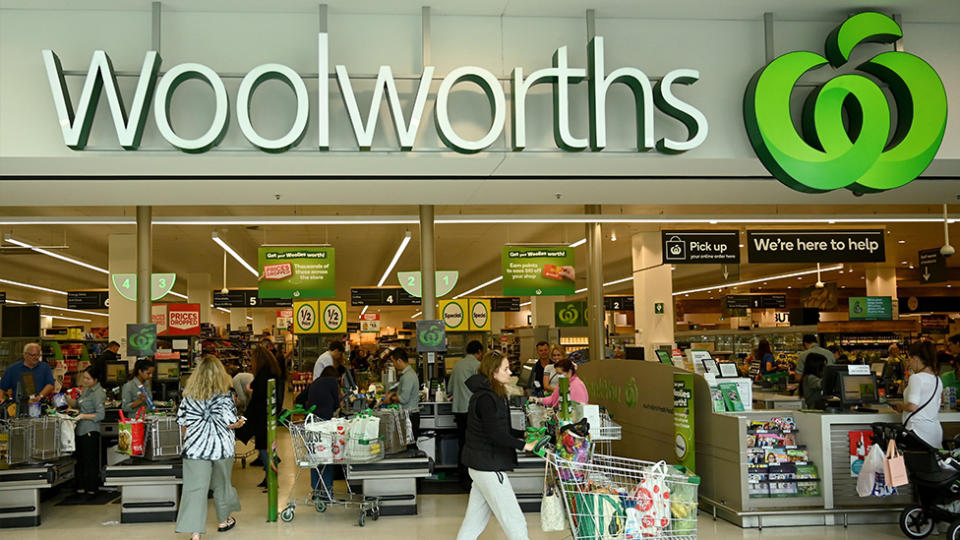Calls for one-way aisles in Coles and Woolworths supermarkets
While social distancing amid the coronavirus pandemic is easy enough to practise in most cases, doing so at the supermarket may be a bit of a struggle.
And in the wake of Australia’s stage one shutdown, mayor of Golden Plains Shire in Victoria, Owen Sharkey, called upon Australian supermarkets to “implement stringent rules to maintain social distances”, adding customers were not abiding by the advice the government had given them.
His solution seemed simple enough – one-way aisles in supermarkets.
Mr Sharkey’s tweet was retweeted by ABC journalist Rafael Epstein, and other Aussies strongly supported the idea.
“YES FRIGGIN PLEASE! I felt like I was dodging landmines in Woolies this morning,” one person replied.
“Nobody adhering to the 1.5m rule.”
Retail expert from Queensland University of Technology, Professor Gary Mortimer, told Yahoo News Australia the idea of one-way aisles had merit.
“It does then stop people walking towards one another, face-to-face,” Professor Mortimer said.
“Although it may not prevent people from overtaking slow browsers in the aisle, which is an ongoing problem.”
However, he said the challenge was how supermarkets would deal with human behaviour – with concerns coronavirus is causing some shoppers and workers anxiety.
Supermarkets need to implement stringent rules to maintain social distances. Make isles one way and limit people in store. Very few abiding the strong message that PM and premier gave.
— Owen Sharkey (@Owen_Sharkey) March 23, 2020
“I think putting even further controls in place may end up in situations where customers are confronting one another over directionality issues,” Professor Mortimer said.
The idea of limiting the number of people in stores at any given time also has merit, Professor Mortimer says, saying this is what some pubs and venues did last week before the nationwide shut down, however this is more difficult to do in a supermarket.
“There’s peak times generally in the mornings and directly after work, which may create some challenges to police those controls,” he said, adding the supermarkets are probably not best placed to police human behaviour in their stores.
While supermarkets have gone to great lengths to prevent further spread of COVID-19, like adding protective screens for employees and hanging signs reminding customers not to abuse workers, Professor Mortimer says the responsibility falls on customers.

“From a consumer’s perspective, if you see the aisle is full of people, don’t walk down it,” he said.
“If you see the supermarket busy, go and have a coffee, unfortunately it’s a takeaway coffee currently, and then go back into the supermarket later.
“If you can shop a little bit earlier than you normally do, or if you can shop a little bit later in the day – sort of 6 or 7 or 8 o’clock at night – to try to avoid the crowds would be a good idea.”
Normal shopping behaviour to be expected in coming days
Despite all the madness in shopping centres and empty shelves, Professor Mortimer says he does think things will start to stabilise .
After three weeks of panic buying items, he suspects by now people will be well-stocked, and the shelves will be able to replenish and people will start going about their shopping in a more normal way.
As people rushed to the shops to stock up on toilet paper and other items, the demand increased creating a logistical nightmare for supermarkets as they scrambled to keep up with the demand.
Professor Mortimer said he has been to the supermarket every day for the past few days to observe people, and when he went this morning, he saw people were acting relatively normal and the shelves were better stocked.

“I was able to get what I needed, which suggests we are starting to get back to a level of normality,” he said.
“There will still be ongoing supply issues, with big bulky things like toilet paper and rice, but that will start to flow through and I think at the end of the week supermarkets will be in a better location inventory wise.”
Although there may be the occasional panic buying, Professor Mortimer suggests this is due to the uncertainty and “disjointed” communication coming from state and federal government departments.
“The Australian government is never going to shut down a supermarket and prevent its population from accessing food and groceries or fuel,” he said.
“Until we get some clear indication on what’s going to happen [as the coronavirus outbreak continues], I think we will still see that spot panic buying.”
Yahoo News Australia has contacted Coles and Woolworths for comment.
Do you have a story tip? Email: newsroomau@yahoonews.com.
You can also follow us on Facebook, Instagram and Twitter and download the Yahoo News app from the App Store or Google Play.




